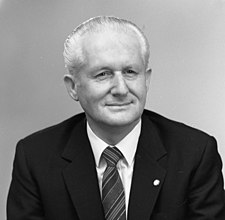Jens Pohl: Difference between revisions
No edit summary |
No edit summary |
||
| Line 42: | Line 42: | ||
|birth_place = [[Oftfeld]], [[Lonzig]], [[Vierz Empire]] | |birth_place = [[Oftfeld]], [[Lonzig]], [[Vierz Empire]] | ||
|death_date = {{death date and age|1981|10|7|1908|4|11|df=yes}} | |death_date = {{death date and age|1981|10|7|1908|4|11|df=yes}} | ||
|death_place = [[Adtrus | |death_place = [[Adtrus]], [[Vierz Empire]] | ||
]], [[Vierz Empire]] | |||
|party = | |party = | ||
|spouse = | |spouse = | ||
Revision as of 11:18, 19 March 2020
This article is incomplete because it is pending further input from participants, or it is a work-in-progress by one author. Please comment on this article's talk page to share your input, comments and questions. Note: To contribute to this article, you may need to seek help from the author(s) of this page. |
Jens Pohl | |
|---|---|
 Official photo, 1976 | |
| Chancellor of the Vierz Empire | |
| In office 27 April 1967 – 14 December 1979 | |
| Monarch | Alexander II Viktor IV |
| Preceded by | Hans Richter |
| Succeeded by | Philipp Lorenz |
| Minister of Foreign Affairs | |
| In office 10 June 1964 – 27 April 1967 | |
| Monarch | Alexander II |
| Chancellor | Otto Wagner Hans Richter |
| Preceded by | Siegmund Gehrke |
| Succeeded by | Torsten Hagmann |
| Reichskommissar for Granzery (North Granzery) | |
| In office 9 December 1956 – 10 June 1964 | |
| Monarch | Alexander II |
| Chancellor | Otto Wagner Hans Richter |
| Preceded by | Albert Jonke |
| Succeeded by | Helibert Schumacher |
| Deputy Minister of Foreign Affairs | |
| In office 18 August 1954 – 5 December 1958 | |
| Chancellor | Thomas Weber Otto Wagner |
| Minister | Siegmund Gehrke |
| Preceded by | Heinz Rieger |
| Succeeded by | Gunter Fährmann |
| Personal details | |
| Born | Jens Erhard Pohl 3 November 1908 Oftfeld, Lonzig, Vierz Empire |
| Died | 7 October 1981 (aged 73) Adtrus, Vierz Empire |
| Alma mater | University of Kasenberg Imperial Political Institute |
| Military service | |
| Allegiance | |
| Branch/service | Imperial Vierz Army |
| Years of service | 1927–1945 |
| Unit |
|
Jens Erhard Pohl (3 November 1908 – 11 July 1981) was a Vierz statesman who served as Chancellor of the Vierz Empire from 1967 to 1979. Prior to his chancellorship, he held a number of positions in the foreign ministry, including that of foreign minister from 1964 to 1967.
Pohl was born to a working-class family in the village of Ostfeld in eastern Lonzig. While performing his mandatory military service, Pohl saw combat in the Great War, where he was wounded-in-action. He studied at the University of Kasenberg after the war, graduating in 1950, and thereafter studied at the Imperial Political Institute until 1952, gaining fluency in Granzerian during his studies. Pohl gained employment at the foreign ministry shortly thereafter, and was made Reichskommissar for North Granzery from 1959 to 1964, where he had tremendous sway over the country's government. He quickly gained favour with Kaiser Alexander II, who made him foreign minister in 1964. Pohl's success in negotiating with Apelia during the Silent War propelled him to the position of Chancellor in 1967.
Identifying with the national conservative wing of the state, Pohl moved quickly to centralize power and suppress the "democratic movement" within the government and refuse the influence of the Kaiser – reestablishing the principle of Kanzlerwirksamkeit (efficacy of [the] chancellor). He issued a number of decrees limiting freedom of the press and speech and curbing the power of the states. Pohl expanded investment in petroleum extraction in West Oridia, while limiting the economic power of the colonial authorities. He was also influential in the expansion of natalist policies, while instructing the immigration ministry to curb immigration from the colonies as well as emigration from Vierzland.
Pohl's foreign policy ended the brief period of detente between Vierzland and Tierada. Referring to Tierada as an "authentically un-Patyrian" state, he revived the pre-war Eschau Doctrine of "direct confrontation" with Vierzland's geopolitical foes. In response to Tierada's placement of nuclear-armed ICBMs in Cestros in 1974, Pohl ordered the closure of the Straits of Vell, causing an international crisis that was diplomatically solved only after months of threats of global thermonuclear war. Anti-Vierz uprisings in Luepola in 1979 resulted in a violent crackdown ordered by Pohl.
The Straits Crisis, the deteriorating situation in Luepola, and the poor economic situation onset by international sanctions and low oil prices led Pohl to fall out of favour with Alexander II and his successor, Viktor IV. He was dismissed from his position in December 1979, and placed under house arrest until June 1980. He died in Adtrus in 1981 at the age of 73.